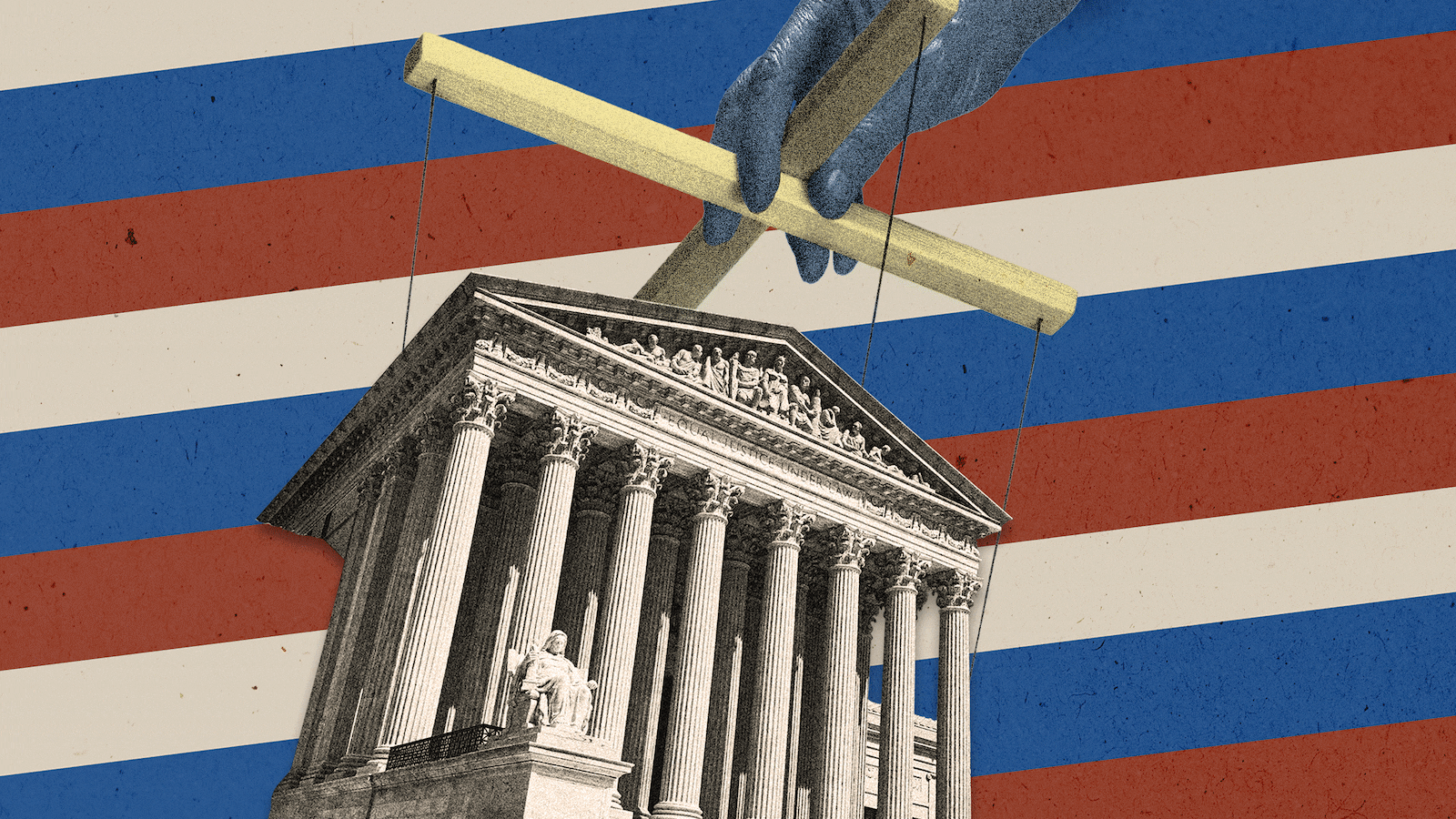During a White House briefing on Wednesday, U.S. President Donald Trump refused to commit to a peaceful transfer of power if he loses the November presidential election. He elaborated: “Get rid of the ballots and you’ll have a very—we’ll have a very peaceful—there won’t be a transfer frankly, there’ll be a continuation.”
During a meeting with Republican attorneys general earlier the same day, Trump predicted that the U.S. Supreme Court would decide the outcome of the forthcoming election. He explained that the rush to replace the late Justice Ruth Bader Ginsburg was designed to break any potential tie between the Supreme Court justices.
If Russian President Vladimir Putin had a heart, both of Trump’s statements would fill it with unadulterated joy. Russia’s perennial authoritarian is no fan of a “peaceful transfer of power” either, unless it means a smooth transition from him—to himself. As for America, the Kremlin’s state media mouthpieces openly expressed their hopes for deeper racial tensions and civil war. On both fronts, the contentious U.S. president is a gift that keeps on giving. Trump’s divisive public messaging is in perfect alignment with the Kremlin’s preferred course of action.
Serendipitously, the Russian state media publicly concluded that the Supreme Court of the United States—including Trump’s nominee—would decide the outcome of the upcoming presidential election, days before the U.S. president made his ominous pronouncements. The Russian state media show Vesti Nedeli, hosted by Dmitry Kiselyov, the CEO of the state news agency Rossiya Sevodnya (Russia Today), may have been the first to issue such a prediction, on Sept. 20.
Vesti Nedeli aired a report by the program’s U.S.-based reporter, Valentin Bogdanov, who concluded in part: “The Supreme Court will play a key part [in the U.S. presidential election], if none of the parties are willing to concede defeat (and everything seems to be pointing in that direction). Currently, the conservatives have a majority there—five justices versus four—but Chief Justice Roberts often votes the same way the liberals do, meaning it’s a tie.”
On Sept. 21, reporting from the United States for the Russian state TV channel Rossiya-1, news correspondent Denis Davydov also surmised that the Supreme Court would end up determining the outcome of the 2020 presidential election. As for Trump’s potential nominee, Judge Amy Coney Barrett, the Russian state media outlet RT has already published an op-ed in support of her candidacy.
The timeline for an unusually speedy confirmation process would be nearly unprecedented in modern history. The average number of days from nomination to final Senate vote for nominees since 1975 is 69.6 days (or approximately 2.3 months). Letting it all hang out, Trump admitted that the outcome of the upcoming presidential election was his main reason for his big rush.
Kiselyov, who has repeatedly described Trump’s tendency to blurt out his deeply unflattering thoughts as “simple-minded,” undoubtedly had a chuckle three days later when the words of the U.S. president closely mimicked the conclusions of Kremlin propagandists. In an eerie congruence with Russian state media, Trump ranted: “I think this scam that the Democrats are pulling, it’s a scam, this scam will be before the United States Supreme Court and I think having a 4-4 situation is not a good situation. Just in case it would be more political than it should be, I think it’s very important to have a ninth judge.” As the expert in discrediting democratic institutions and setting up rigged court systems, Putin would surely agree. Perhaps this scenario was even discussed during one of many conversations between the two world leaders, which have become unusually frequent in 2020.
On Monday, Trump bragged to his rallygoers: “I like Putin. He likes me.” What’s not to like? Trump refused to condemn the Kremlin for its ongoing interference in the U.S. elections, decided not to confront Putin about Russian bounties reportedly placed on the heads of American soldiers, and uttered nary a peep about the poisoning of prominent dissident Alexei Navalny.
But there is a fly in the ointment, it is the Kremlin’s increasing irritation with the U.S. line on Nord Stream 2, a new export gas pipeline from Russia to Europe that is nearing completion. U.S. Secretary of State Mike Pompeo said in an interview with German Bild-TV: “We hope that the Nord Stream 2 pipeline won’t be completed. We’re working to make sure we build out a coalition that prevents that from happening.” Putin, who is notoriously thin-skinned about comedic mockery, apparently decided to send in the clowns.
The hosts and guests on the Russian state TV show 60 Minutes equated Pompeo’s statement with a declaration of war. Notorious Russian lawmaker Vladimir Zhirinovsky ranted and raved about the U.S. threat to Nord Stream 2, vocally regretting his champagne-soaked celebration of Trump’s 2016 election victory. When Alexei Naumov of the Russian International Affairs Council pointed out that Russia’s continued course of action with respect to Navalny’s poisoning might lead to the shutdown of Nord Stream 2, Zhirinovsky became enraged and threatened to pummel his fellow panelist “to silence him for the rest of his life.”
The same day, RT released a deepfake video featuring the U.S. president in a new job on Russian state television after losing his bid for re-election. The video featured an image that identified Trump as “Putin’s apprentice” and “Putin’s candidate.” There’s a grain of truth in every joke, but since Putin has no perceptible sense of humor, RT’s mockery and Russian state media’s outrage can be read as a coded threat. Trump’s lack of a reaction—as opposed to his constant badgering of political figures and U.S. media outlets—is a reaction in itself. Trump’s inability to stand up to Putin is a cherished commodity for the Kremlin, giving Russia no incentive to take its fingers out of the American pie.







